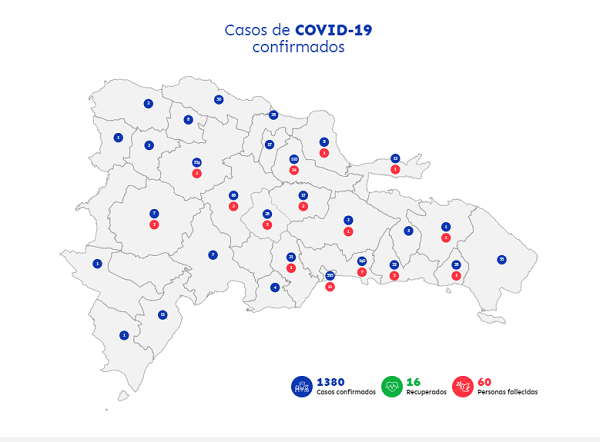
The Ministry of Public Health reports on 1,380 confirmed cases of Covid-19 in the Dominican Republic as of 1 April 2020 at 6pm, according to Coronavirus Bulletin #14. The number of cases is 96 more than the previous 1,284. Of these, 179 persons are hospitalized and another 1,125 are monitored while in self-isolation or in isolation shelters. There are 60 deaths now, up from 57 on the previous day.
The concentration of cases by place of residence is 39% in the National District, 14% in the province of Santo Domingo, 12% in Santiago, and 8% in Duarte province.
Provinces with the most new cases are: Santo Domingo province (22), Santiago (21), National District (15), Duarte / San Francisco de Macorís (9), La Vega (4), La Romana (4) and Sánchez Ramírez (4).
The Ministry of Public Health reports the results of 4,018 tests as compiled by the National Epidemiology Surveillance System (SINAVE). Of the tests given, 2,638 were negative. Testing is still very limited in the country, with long waiting lists even in the cases of persons with apparent symptoms. The number of tests, nevertheless, is expected to increase significantly this week as more have arrived to the country and the pace of testing people have been stepped up considerably.
Public Health Minister Dr. Sánchez Cárdenas said that there were six persons discharged on 1 April. These included two Venezuelan women of 20 years old; an 8-year old Ukrainian child; a 70-year old Canadian woman; an 82-year old Dominican and a 56-year old Dominican.
According to Bulletin #14 of the Ministry’s Epidemiology Directorate-General, the evolution of the health crisis nationwide is:
National District: 535 cases, 15 new cases, 11 deaths
Santo Domingo province: 190 cases, 22 new cases, 7 deaths, including 1 new death
Santiago: 159 cases, 21 new cases, 2 deaths
Duarte (San Francisco de Macorís): 110 cases, 9 new cases, 24 deaths
La Vega: 88 cases, 4 new cases, 2 deaths
La Altagracia (Higuey, Veron, Punta Cana): 35 cases, 3 new cases
Puerto Plata: 30 cases, 2 new cases
Espaillat (Moca): 28 cases
Monseñor Nouel (Bonao): 28 cases, 1 new case, 2 deaths
La Romana: 28 cases, 4 new cases
San Cristóbal: 21 cases, 1 death
San Pedro de Macorís: 23 cases, 3 new cases
Hermanas Mirabal: 17 cases, 2 new cases
Sánchez Ramírez (Cotuí): 17 cases, 4 new cases, 2 deaths
Samaná: 13 cases, 1 death
Barahona: 11 cases, 4 new cases
Valverde: 8 cases
María Trinidad Sánchez (Salcedo): 8 cases, 1 death
Azua: 7 cases
San Juan de la Maguana: 7 cases, 2 deaths
Hato Mayor: 3 cases
Monte Plata: 2 cases, 1 death
Dajabón: 1 new case
Independencia: 1 case
Pedernales: 1 case
El Seibo: 1 new case
Provinces with no reported cases of Covid-19 as of 1 April 2020 at 6pm: Bahoruco, Elías Piña, and San José de Ocoa.
The first case of Covid-19 was detected on 1 March 2020, just two weeks before a municipal election was scheduled and after a month of intense carnival partying.
The government announced on 2 April 2020 that it is extending the curfew for another 15 days, or through 18 April and has requested another 25 days for the State of Emergency that began on 19 March 2020 and expires on 13 April 2020. Congress needs to meet for the approval. The Senate would meet on Monday to review the extension of the State of Emergency.
The Ministry of Public Health continues to urge people to stay at home, keep social distance, exercise maximum hygiene, to not touch faces, and exercise self-isolation when having symptoms or having been in contact with persons who have tested positive or have symptoms. Supermarkets, pharmacies and banks are requiring that persons use facial masks to enter.
Public Health Minister Dr. Sánchez Cárdenas has explained that people who present Covid-19 symptoms (fever, dry cough, shortness of breath) should contact their physician. He says in most cases these patients are stable and don’t need testing or treatment, and are recommended to stay at home until their fever resolves, they stop coughing, and are asymptomatic. Most importantly, he stresses these people need to self-isolate to not spread the disease to family and friends. In general, people are asked to avoid gatherings.
During the press conference on 2 April 2020, Dr. Sánchez Cárdenas said that President Danilo Medina had given orders that all resources that are needed be available for the management of the outbreak. “We are in the process of the rise of the curve, but there are positive elements in its evolution. That is, we have the resources and will be making adjustments to the budget as needed,” he said.
As of 1 April 2020, there were 16 confirmed cases in Haiti of 154 persons tested. On 19 March, the first two cases of the disease were confirmed in the neighboring country. Haiti has also declared a state of emergency and ordered schools, factories, and religious entities to close, established a curfew, and closed the country’s borders after previously suspending air travel from most countries.
Reports are that around 75 Dominicans have died in New York City. New York City is the second-largest Dominican city in numbers of Dominican population. Dominicans that want to return to the country need to contact Dominican consulates and embassies abroad.
Follow the story in Spanish:
Ministry of Public Health – Bulletin No. 14
YouTube
Listin Diario
El Dia
El Dinero
Diario Libre
Listin Diario
N Digital
3 April 2020

